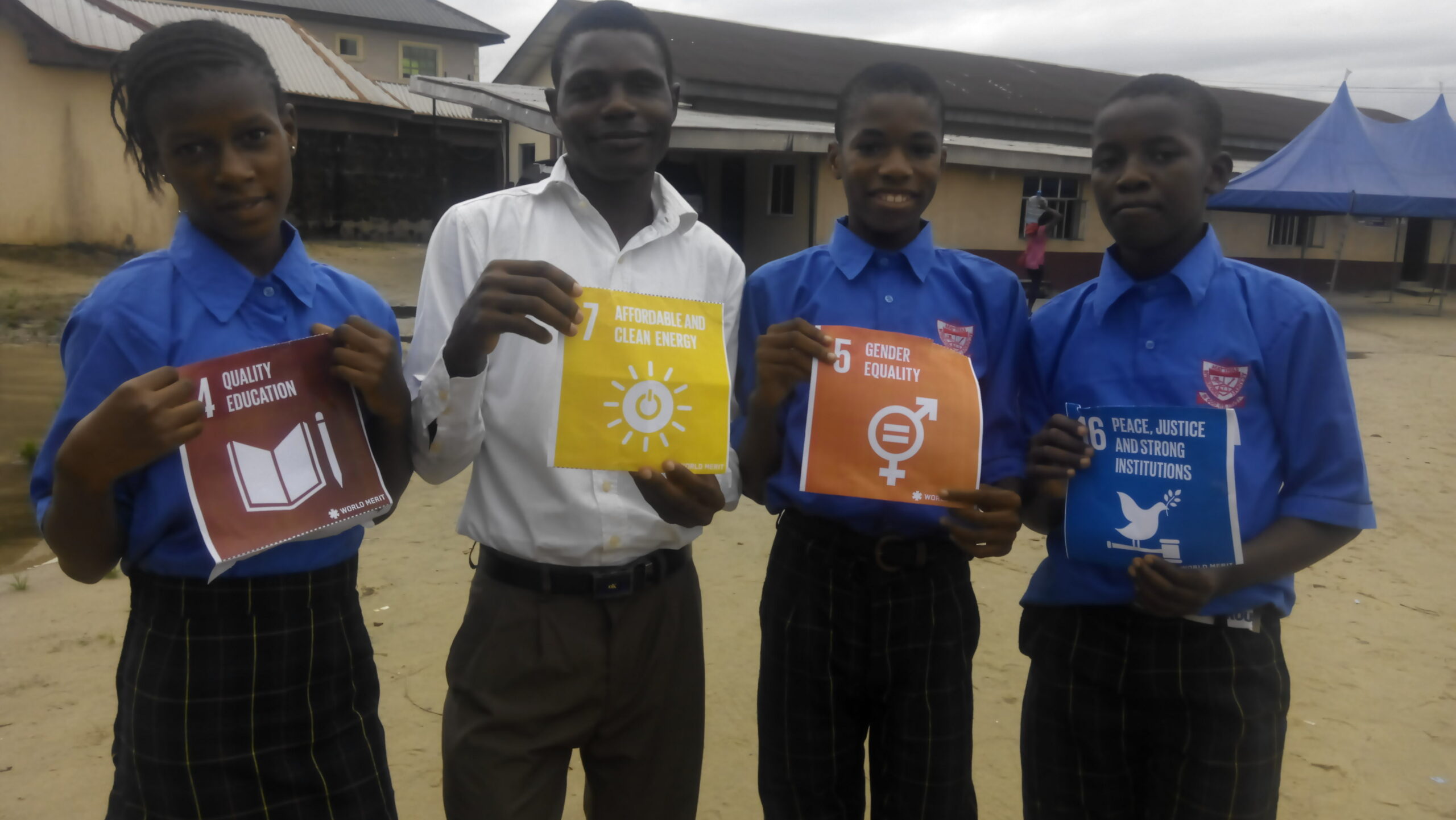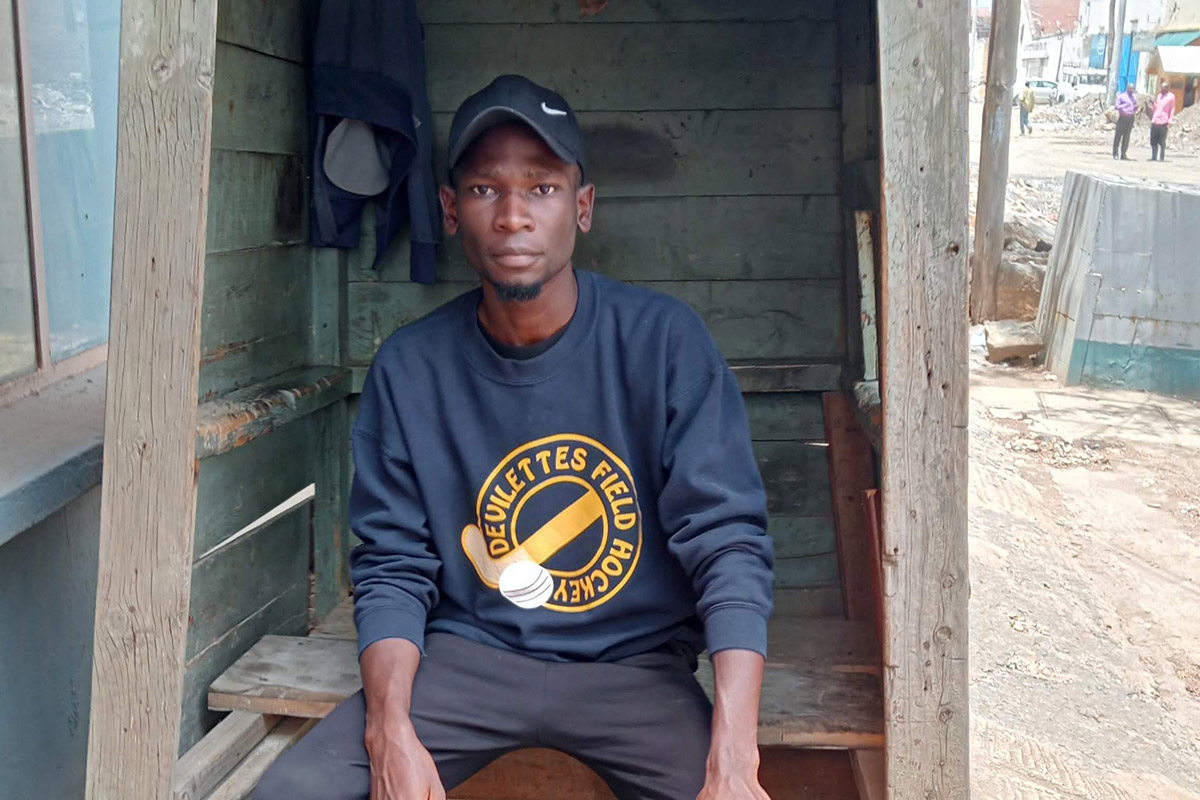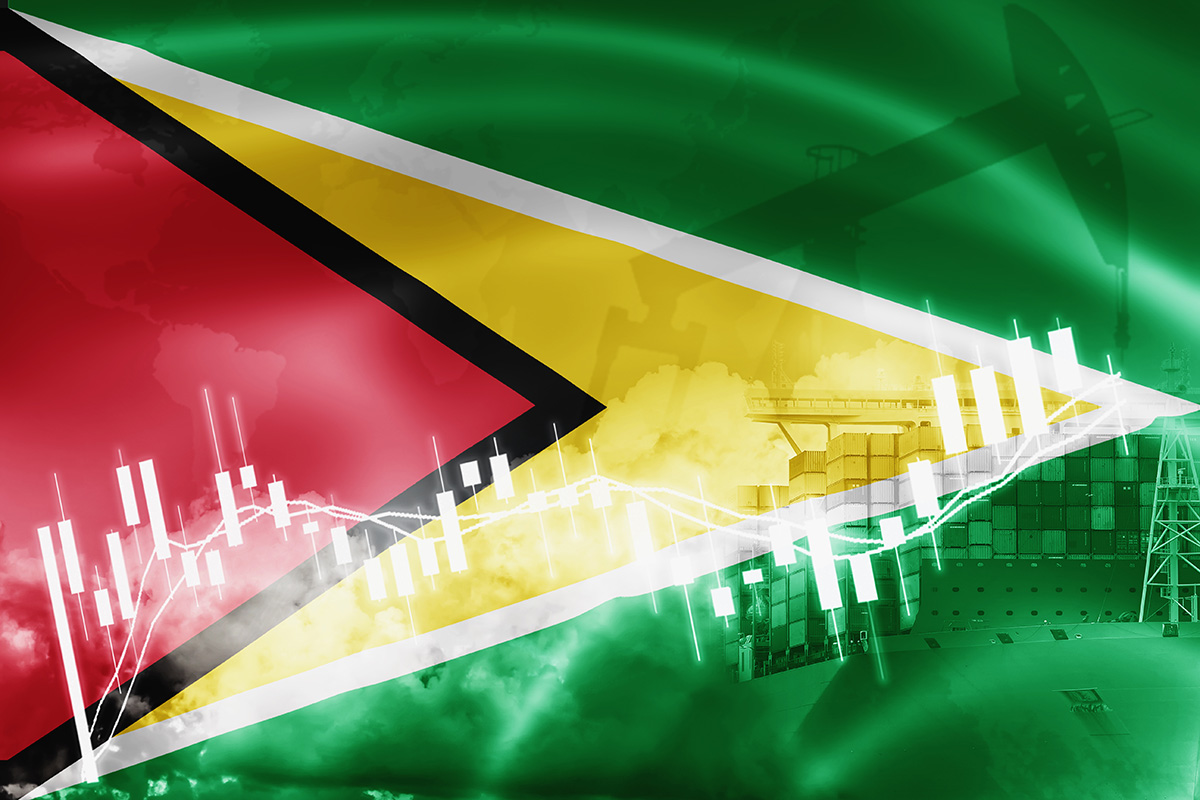“Independence celebration for students”
October 24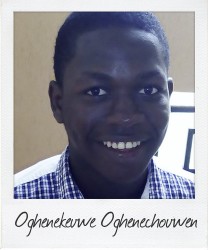 Independence day was a day of learning for Oghenekevwe Oghenechovwen, 18, a Commonwealth Correspondent from Warri in Nigeria, who marked the occasion by taking part in sessions with change-makers and keen students.
Independence day was a day of learning for Oghenekevwe Oghenechovwen, 18, a Commonwealth Correspondent from Warri in Nigeria, who marked the occasion by taking part in sessions with change-makers and keen students.
Fifty-six years after independence from the British, Nigerians are way into the journey of being responsible for the progress of her people, and they have accepted the truth that corruption and ignorance are the very things that draw us back.
As actions are taken to fight these draw-backs, especially at the federal level, there still remains the burden of giving relevant education – be it formal, non-formal, or informal – to school students and other young people. In this light, Children World Outreach, a not-for-profit, brought secondary school students in Jeddo community together on October 1, 2016 to mark Nigeria’s 56th Independence Anniversary, with a view of sharing experiences on societal and youth issues and increasing opportunities for informal dialogue among the students. I was thrilled to be invited to share my knowledge of the UN Global Goals with the students.
Jeddo is a large community that lies behind the first Nigerian wholly owned refinery; the Warri Refining and Petrochemical Company (WRPC). Despite the close presence of this national oil asset, it is difficult to decide whether the community is rural or peri-urban, as there is only one inadequately facilitated basic health centre, an abandoned water borehole facility, and an overpopulated school, which are all government-owned. Also, the one-lane road is continuously pot-holed, and many indigenes live in mud houses and shanties. The silver linings I noticed in this community were the stable electric power supply, and the schools, cold room, sachet water production factory, and retail businesses that are owned by advanced non-indigenes who came to settle down after retirement. These complement the government school, at a higher cost, and provide some employment for the teeming youths.
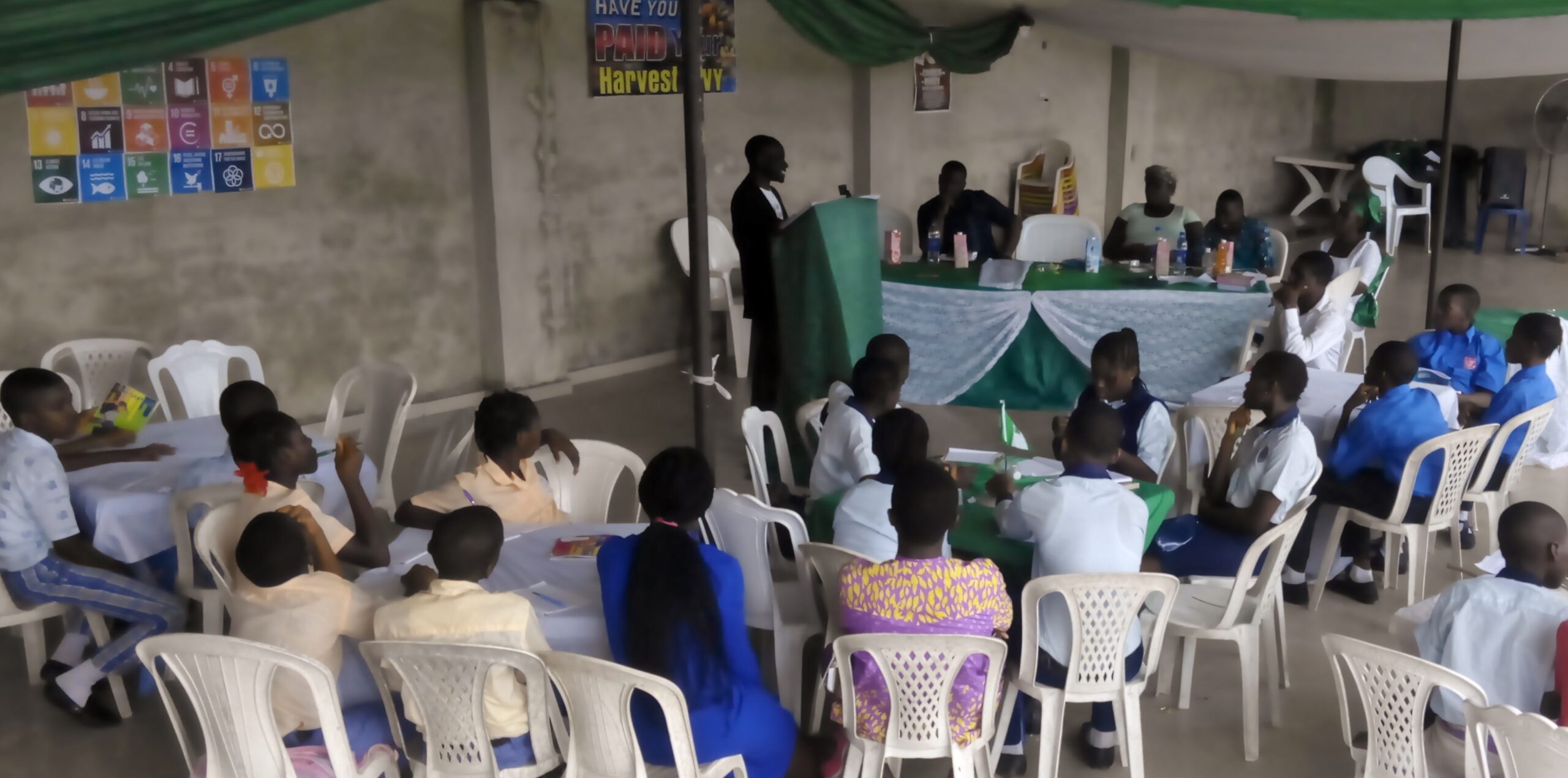 Ignoring these visible challenges and armed with the belief of a brighter and better Nigeria, the student representatives came eagerly to actively learn and dialogue about developmental issues associated with Nigeria. This act alone gave me a ray of hope, and it convinced me that this group of students would go on to become shapers, leaders and innovators that would create and implement necessary, sustainable solutions to diverse problems. Voluntarily anchored by Helen Aghoghi; a senior Inspector with the state’s Ministry of Education, all the other facilitators had personal experiences and interests that provided them with a unique credential to be listened to: from Dr. Olayinka Ebikagboro, a practicing medical doctor who told the students about the setbacks she faced and the difficult decisions she had to make in pursuit of her career; to youthful Michael Inagbor, Esq. who raised engaging discussions on determination, accountability, and human rights; and to Joseph Afor and Daniel Ejoh, two unapologetic entrepreneurs and authors who urged the students towards innovation and shared some societal values with them.
Ignoring these visible challenges and armed with the belief of a brighter and better Nigeria, the student representatives came eagerly to actively learn and dialogue about developmental issues associated with Nigeria. This act alone gave me a ray of hope, and it convinced me that this group of students would go on to become shapers, leaders and innovators that would create and implement necessary, sustainable solutions to diverse problems. Voluntarily anchored by Helen Aghoghi; a senior Inspector with the state’s Ministry of Education, all the other facilitators had personal experiences and interests that provided them with a unique credential to be listened to: from Dr. Olayinka Ebikagboro, a practicing medical doctor who told the students about the setbacks she faced and the difficult decisions she had to make in pursuit of her career; to youthful Michael Inagbor, Esq. who raised engaging discussions on determination, accountability, and human rights; and to Joseph Afor and Daniel Ejoh, two unapologetic entrepreneurs and authors who urged the students towards innovation and shared some societal values with them.
During the breakout session I discussed about the 17 UN Global Goals. To allow for greater participation and learning optimisation, I had the students take short quizzes that relate to Nigeria, the SDGs, and their daily lives. Allowing them to work in pairs without assistance from their teachers, they became more engaged and the immediate feedback was easy to assess. After collaborative review, it was troubling to know that they had zero knowledge of the SDGs. This revelation led to our open discussions.
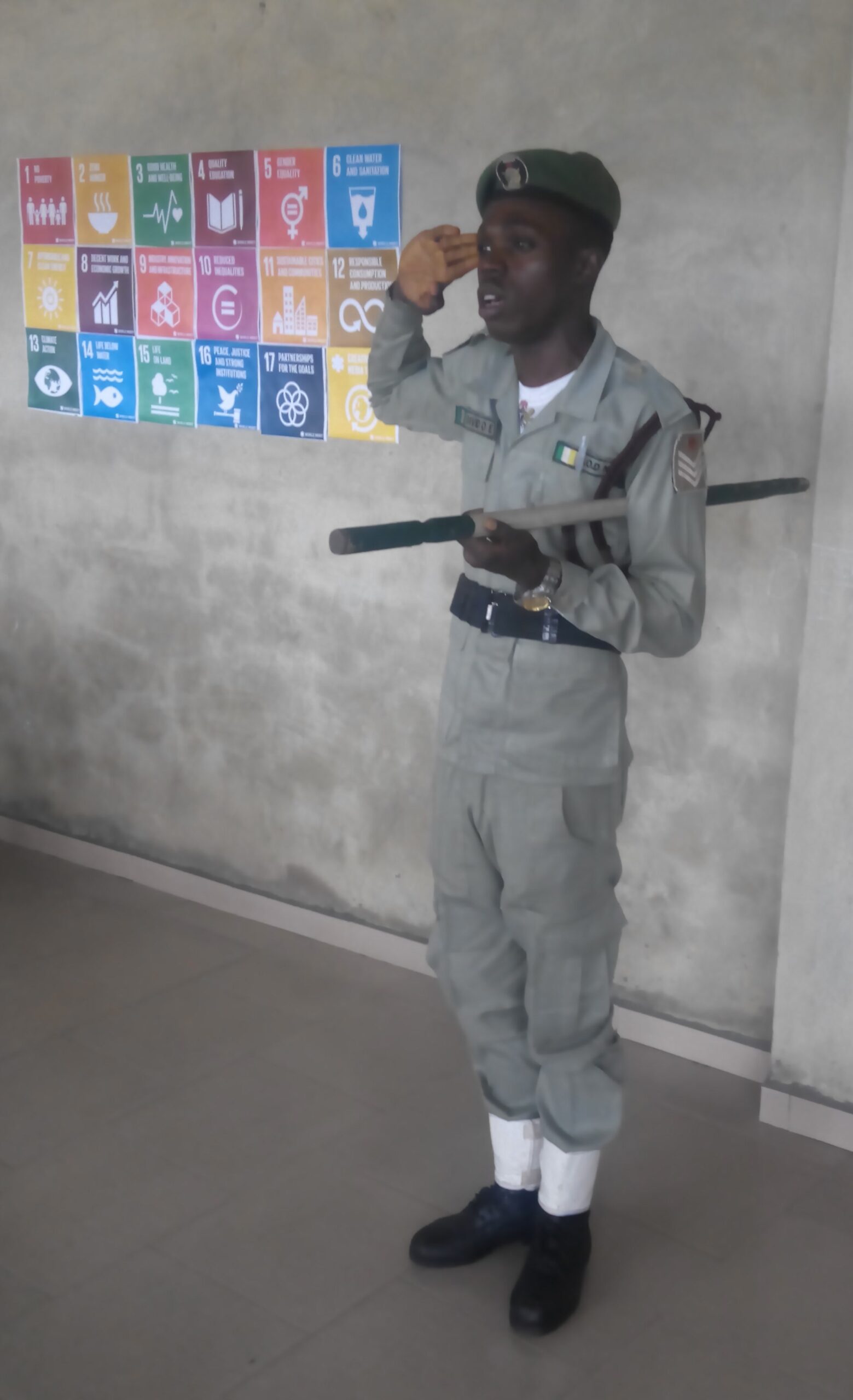 The closing presentation on the Nigerian Army by David Egere, a fresh graduate of Science Laboratory Technology and a member of a voluntary paramilitary outfit, made the event memorable for me. To him, joining the army is patriotic and it is a high calling. And his desire to join the army as an academician is flamed up because of these reasons. Though the student representatives from the Jeddo Community School, Debbitz School, Climax Model School, and God’s Favour School left as better informed and active citizens, I believe more collective efforts should be made by the Nigerian government, CSOs, and individuals in ensuring that societal subjects, such as the SDGS, become commonplace in basic and higher academic settings.
The closing presentation on the Nigerian Army by David Egere, a fresh graduate of Science Laboratory Technology and a member of a voluntary paramilitary outfit, made the event memorable for me. To him, joining the army is patriotic and it is a high calling. And his desire to join the army as an academician is flamed up because of these reasons. Though the student representatives from the Jeddo Community School, Debbitz School, Climax Model School, and God’s Favour School left as better informed and active citizens, I believe more collective efforts should be made by the Nigerian government, CSOs, and individuals in ensuring that societal subjects, such as the SDGS, become commonplace in basic and higher academic settings.
I never had the opportunity to learn during Independence Anniversary Celebrations while I was still in secondary school. I was either at the State’s Government House playing games with other children, or at the Capital’s Cenotaph watching the Armed Forces parade. I went home at the end of the day with customised gifts and memories of the long convoys of top government officials. I would have preferred knowledge – relevant knowledge!
Photo credits: courtesy of Oghenekevwe Oghenechovwen
…………………………………………………………………………………………………………………
About me: A B.Tech. student of Meteorology and Climate science (FUTA), I am an idealist, observer, a leader, creative writer and ready volunteer.
I am interested in volunteering, youth and education, leadership, women empowerment, climate change, politics, media and information technology.
My ambition is to make change and cause global reformation with my pen, resources and time.
…………………………………………………………………………………………………………………
Opinions expressed in this article are those of the author and do not necessarily represent the views of the Commonwealth Youth Programme. Articles are published in a spirit of dialogue, respect and understanding. If you disagree, why not submit a response?
To learn more about becoming a Commonwealth Correspondent please visit: http://www.yourcommonwealth.org/submit-articles/
…………………………………………………………………………………………………………………
